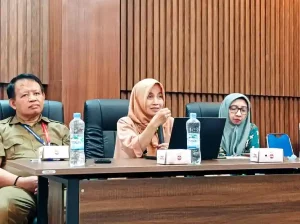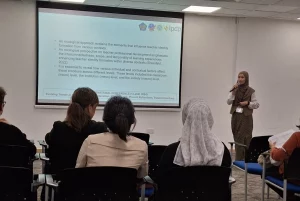UNAIR NEWS – Prof Dr. Alfinda Novi Kristanti DEA was inaugurated as UNAIR’s professor on Thursday, March 2, 2023, at Garuda Mukti Hall, Management Building, MERR (C) Campus. She was the 21st professor of Faculty of Science and Technology (FST).
In her scientific oration, Prof. Alfinda presented her research result on phytochemical phenolic compounds in medicinal plants and endemic plants in Indonesia as pharmaceutical raw materials. The research examined the function of plants with secondary metabolite compounds with various structures and bioactivities for humans.
In the past decade, the professor has conducted research on agarwood (Aquilaria microcarpa), Uncaria, and sambung nyawa (Gynura procumbens) plants. In the Aquilaria species, there is a chromone content, which is similar to the 2-styrylchromone group compound. The availability of this compound is rare, therefore, an organic synthesis must be carried out.
She found nine compounds of the 2-styrylchrome group from the synthesis with benzaldehyde structure variation. The compound was tested in silico through a docking experiment using protein as a drug target for the development of cancer chemotherapy.
“This research provides a model of how nature has given the compound structure idea to conduct compound synthesis with better potentials,” said the Chemistry Department lecturer.
Prof. Alfinda further discussed the main component of gambier, the catechin of the flavonoids. The isolation showed that one kilogram of gambier contains 18 grams of catechin with a 90 percent purity level.
“Catechin compounds can be used as an anti-cancer, antiviral, and antimicrobial. Their antioxidant activity is far greater than vitamin C. It indirectly prevents the risk of cancer,” she stated.
UNAIR 275th professor since it became a legal entity (PTN-BH) also explained her research result on sambung nyawa (Gynura procumbens) plants for medication. The root of Gynura procumbens is much more active than the leaves. However, using the root means uprooting the entire plant.
Prof. Alfinda based it on the increase in biomass and metabolite content using the adventitious root culture of plants. She also developed the plant potential using the nanotechnology of plant extract nanocapsules, which enhance anti-dengue function and decrease toxicity.
In the end, she stated that plants’ chemical communication positively impacts humans by producing secondary metabolites. The development of organic synthesis, particularly nanotechnology, has been proven effective in increasing the potential of medicinal plants as raw materials for pharmaceutics.
“Therefore, research on the use of secondary metabolites in plants is highly important, it supports the development of a drug self-sufficiency ecosystem in Indonesia,” Prof. Alfinda ended.
Author: Sela Septi Dwi Arista
Editor: Nuri Hermawan









